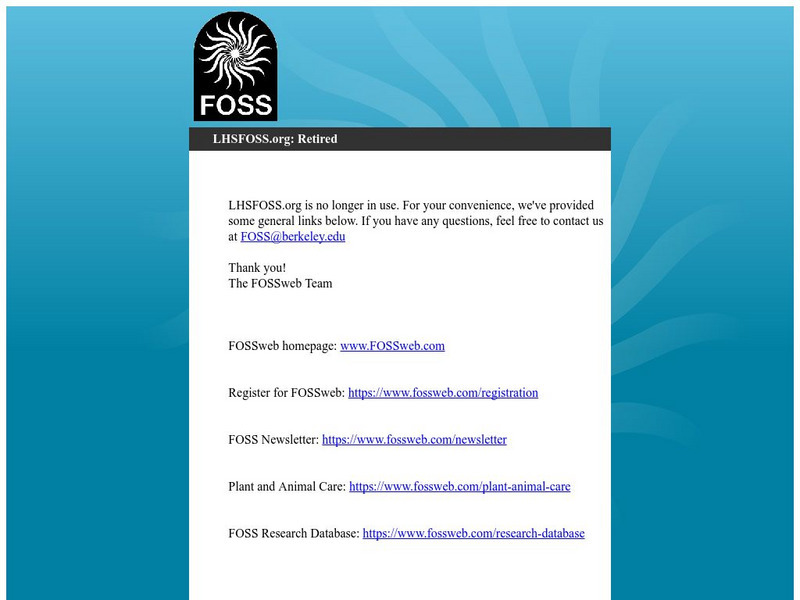Curated OER
Mealworms
Crawl into the world of the darkling beetle with this scientific investigation. Watch as the insects move through the larval, pupal, and adult stages of life, recording observations along the way. Discuss the necessities of life as young...
Curated OER
Imaginary Insect Zoo
In this science worksheet, students create an imaginary zoo. Students write information about their imaginary insect, including its name, how it eats, hears, seeing, smells, and eats.
Curated OER
Mealworm Metamorphosis
Students observe offspring (mealworms) that do not initially resemble their parent organism (darkling beetles) throughout complete metamorphosis. They also create and maintain an appropriate habitat for the mealworms.
Curated OER
The Life Cycle of the Mealworm
Fourth graders provide a habitat for live mealworms and observe their life cycle. In this animal life cycle and scientific inquiry lesson, 4th graders create a habitat for a live mealworm and observe and record related data as it grows....
Curated OER
A Bug's Life: Diary of an Insect's Metamorphosis
Fifth graders examine the stages of insect's to understand heredity. In this inherited traits lesson, 5th graders explore the life of the honeybee for its inherited traits. Students recognize the difference between inherited traits...
Curated OER
Creeping and Crawling Observing Mealworms and Earthworms
Fifth graders observe mealworms and earthworms. In this mealworm and earthworm lesson, 5th graders complete an experiment in which they observe the life cycle and living conditions of mealworms and earthworms. They experiment with...
Curated OER
What Stages Do Insects Go Through?
Fourth graders observe mealworms over a period of time and record any changes they observe. They record any changes in color, length, behavior, and any other noticeable changes, identify the stages of the mealworms, and create a chart...
Curated OER
Life Cycle
Third graders examine and compare the life cycles of a variety of different animals. They analyze photos of animals and discuss any unique body parts and why those parts function they way they do. Next, they observe mealworms and...
Curated OER
Magical Metamorphosis
Sixth graders compare and contrast incomplete and complete metamorphosis using a Venn Diagram. They predict, observe, measure, and record data on the life cycle of mealworms. Students write and illustrate the life cycle of the mealworm....
Curated OER
Cycles of Life
Students begin their study of insect life cycles by listening to a read aloud of Eric Carle's The Very Hungry Caterpillar. They learn the vocabulary of metamorphosis including egg, larva, pupa, chrysalis, and adult. They observe actual...
Curated OER
Butterfly Adventure
Students in second grade are paired with fifth grade computer research buddies. They observe the characteristics of caterpillars, and identify the four stages of the caterpillar to butterfly life cycle. They graph the number of...
Curated OER
Observing and Experimenting with Life Cycles: Mealworm Project
Students participate in a hands-on experiment to observe mealworms going through a life cycle. Students conduct the experiments at home on their own and record their predictions and observations on student worksheets
Curated OER
Cycles of Life
Students explore the metamorphosis of an insect as it changes from an egg to pupa to an adult. the process of change is observed, recorded, and transformed into a life cycle picture.
Curated OER
Magnificent Metamorphosis
Students discover stages in metamorphosis through up close and real encounters with video, hands-on investigative and interactive activities using mealworms.
Curated OER
Getting to Know You: Meal Worms
Students recognize differences between themselves and other people, and accept their uniqueness as a positive gift, by studying meal worms.
Curated OER
The Magic School Bus Spins a Web
Students learn along with Ms. Frizzle's class. In this Magic School Bus lesson plan, students explore the world of spiders as they travel into a science fiction film to learn the truth about spiders.
Curated OER
Creature Features
Students examine why certain animals live in only specific places throughout the world. Using animals, they classify them based on their characteristics and identify their basic needs. They also observe and compare the life cycles of...
Curated OER
How Hot is Too Hot?
Fifth graders use the scientific method to conduct experiments on the temperature effects on organisms. For this temperature effects on organisms lesson plan, 5th graders observe and record the hatching or the developing of organisms...
Curated OER
What Does It Eat?
Students, working in research teams, investigate the eating habits of crickets. They collect and record data and compare their methods and results with other groups by making tables or graphs. They sumarize their findings with posters or...
University of Arizona
Center for Insect Science Education: Darkling Beetle/mealworm Information
Learn all about mealworms: their diet, life cycle, habitat, and how to learn about them in the classroom.
Other
Foss Web: Mealworms and Darkling Beetles (Tenebrio Beetle)
This article by FOSS provides an in depth look at the larval stage of the Darkling Beetle, also known as the mealworm. This site describes Darkling beetle characteristics and how to care for them. Often these insects are used for...




















